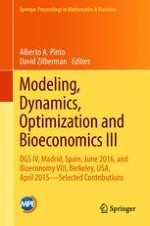2018 | OriginalPaper | Buchkapitel
Myopia of Governments and Optimality of Irreversible Pollution Accumulation
verfasst von : Laura Policardo
Erschienen in: Modeling, Dynamics, Optimization and Bioeconomics III
Aktivieren Sie unsere intelligente Suche, um passende Fachinhalte oder Patente zu finden.
Wählen Sie Textabschnitte aus um mit Künstlicher Intelligenz passenden Patente zu finden. powered by
Markieren Sie Textabschnitte, um KI-gestützt weitere passende Inhalte zu finden. powered by
